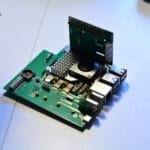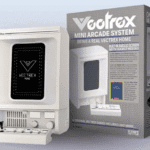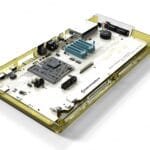Christian Cawley is a writer and editor who covers consumer electronics, IT, and entertainment media. He has written for publications such as Computer Weekly, Linux Format, MakeUseOf.com, and Tech Radar.
He also produces podcasts, has a cigar box guitar, and of course, loves retro gaming.
Despite a strong campaign, the RetroBlock 2 handheld console – clearly inspired by the Nintendo GameCube controller – has failed to reach its Kickstarter funding goal.
Running Linux (desktop support included), with Retropie and EmulationStation, the RetroBlock 2 was the brainchild of RetroStone 2 developer Pierre-Louis Boyer, as a reaction to hand cramps while playing on the more Gameboy-like RetroStone 2 late one night.
Capable of playing titles from, for example, Gameboy and Sega Genesis, and indeed any game up to PS1 and N64, the RetroBlock 2’s failure to meet funding is quite a disappointment. Many expectant backers point to perceived limitations of the RetroStone 2 as the reason for RetroBlock 2 not proceeding, and there is some value to this argument.
RetroBlock 2 and RetroStone 2 Swappability
RetroBlock 2 was planned to have 3 x USB ports, with support for external USB gamepads for multiplayer. Alternatively, gamers could have hooked up a mouse and keyboard for Linux desktop access. An Ethernet port was planned, along with an audio jack and USB-C charge port. An on/off button with software integration would have avoided SD card corruption. HDMI-out was intended to enhance the multiplayer experience.
With 2x analogue thumbsticks, a D-pad, L1 and L2, R1 and R2 buttons, the RetroBlock 2 would have had stereo speakers. Games would have been enjoyed on a 3.5-inch LCD with 4:3 aspect ratio. The perfect ratio for retro gaming, games would have been seen at a crisp 640×480 resolution.
RetroBlock 2 would have been essentially based on the RetroStone 2, hence the name. This closeness enabled the planned swapping of SD cards between the devices, as well as the 4000mAh battery. Abandoned stretch goals included vibration motors, Bluetooth, and Wi-Fi.
So, is it all over for RetroBlock 2? Probably. But there is a chink of light at the end of the tunnel, with Boyer observing in a discussion with sad backers
And yes you are right, the pi4 might be the way to go. Specially with the compute module 4.
We’ll wait and see what happens. In the meantime, we’ve plenty of alternative handhelds to keep us busy…
Affiliate Disclosure: Some of the links in this post may be affiliate links, which means I may earn a small commission if you make a purchase through those links. This comes at no extra cost to you. Thank you for your support!
Christian Cawley is a writer and editor who covers consumer electronics, IT, and entertainment media. He has written for publications such as Computer Weekly, Linux Format, MakeUseOf.com, and Tech Radar.
He also produces podcasts, has a cigar box guitar, and of course, loves retro gaming.








